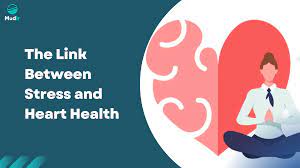
The connection between stress and your heart’s well-being may seem intricate, but it plays a pivotal role in maintaining a healthy cardiovascular system.
Stress is often linked to major risk factors for heart disease, which include high blood pressure, high cholesterol, diabetes, obesity, and physical inactivity.
Understanding the “Fight-or-Flight” Response:
When you encounter a stressful situation, your body initiates the “fight-or-flight” response. During this reaction, your body releases chemicals like cortisol and adrenaline, preparing you for immediate action. While this response is essential in emergencies, it can be counterproductive in everyday situations, such as traffic jams.
The Impact of Chronic Stress:
Chronic stress, characterized by ongoing challenges like a stressful daily commute, marital issues, or workplace pressure, can have severe health consequences. Dr. Michael T. Osborne, a cardiologist, explains that psychological stress triggers a cascade of reactions within the body.
These reactions include arterial inflammation, increased blood clotting, and impaired blood vessel function, all of which contribute to atherosclerosis, the underlying arterial disease responsible for most heart attacks and strokes.
Chronic stress can also disrupt your mood, sleep patterns, and appetite. Studies have shown that prolonged emotional stress not only affects your daily life but can also lead to biological evidence of cardiovascular disease.
According to the American Heart Association (AHA), chronic stress can directly contribute to heart disease, the leading cause of death in the United States. Stress can impact cardiovascular health through mechanisms like elevated blood pressure and inflammation.
The Health Implications of Stress:
A study published in the journal JAMA in 2019 found that work-related stress increased the risk of developing atrial fibrillation, an irregular heartbeat associated with a higher risk of stroke and heart failure.
Managing Stress for Better Heart Health:
The best way to reduce the risk of future cardiovascular issues is by effectively managing stress levels. Here are some strategies to consider:
- Physical Activity: Regular exercise can help alleviate stress and improve overall cardiovascular health.
- Healthy Diet: Consuming a balanced diet low in saturated and trans fats, cholesterol, and sodium supports heart health.
- Relaxation Techniques: Practices like deep breathing, meditation, and progressive muscle relaxation can reduce stress.
- Social Support: Maintaining strong social connections and seeking support from friends and family can aid in stress management.
- Time Management: Efficiently managing your time and prioritizing tasks can reduce feelings of being overwhelmed.
- Professional Help: If stress significantly impacts your mental health, seeking assistance from a mental health professional is crucial.
Managing stress is essential not only for your mental well-being but also for maintaining a healthy heart. Prioritizing stress reduction can lead to improved cardiovascular health and an overall better quality of life.
The connection between stress and your heart’s well-being may seem intricate, but it plays a pivotal role in maintaining a healthy cardiovascular system.
Stress is often linked to major risk factors for heart disease, which include high blood pressure, high cholesterol, diabetes, obesity, and physical inactivity.
Understanding the “Fight-or-Flight” Response:
When you encounter a stressful situation, your body initiates the “fight-or-flight” response. During this reaction, your body releases chemicals like cortisol and adrenaline, preparing you for immediate action. While this response is essential in emergencies, it can be counterproductive in everyday situations, such as traffic jams.
The Impact of Chronic Stress:
Chronic stress, characterized by ongoing challenges like a stressful daily commute, marital issues, or workplace pressure, can have severe health consequences. Dr. Michael T. Osborne, a cardiologist, explains that psychological stress triggers a cascade of reactions within the body.
These reactions include arterial inflammation, increased blood clotting, and impaired blood vessel function, all of which contribute to atherosclerosis, the underlying arterial disease responsible for most heart attacks and strokes.
Chronic stress can also disrupt your mood, sleep patterns, and appetite. Studies have shown that prolonged emotional stress not only affects your daily life but can also lead to biological evidence of cardiovascular disease.
According to the American Heart Association (AHA), chronic stress can directly contribute to heart disease, the leading cause of death in the United States. Stress can impact cardiovascular health through mechanisms like elevated blood pressure and inflammation.
The Health Implications of Stress:
A study published in the journal JAMA in 2019 found that work-related stress increased the risk of developing atrial fibrillation, an irregular heartbeat associated with a higher risk of stroke and heart failure.
Managing Stress for Better Heart Health:
The best way to reduce the risk of future cardiovascular issues is by effectively managing stress levels. Here are some strategies to consider:
- Physical Activity: Regular exercise can help alleviate stress and improve overall cardiovascular health.
- Healthy Diet: Consuming a balanced diet low in saturated and trans fats, cholesterol, and sodium supports heart health.
- Relaxation Techniques: Practices like deep breathing, meditation, and progressive muscle relaxation can reduce stress.
- Social Support: Maintaining strong social connections and seeking support from friends and family can aid in stress management.
- Time Management: Efficiently managing your time and prioritizing tasks can reduce feelings of being overwhelmed.
- Professional Help: If stress significantly impacts your mental health, seeking assistance from a mental health professional is crucial.
Managing stress is essential not only for your mental well-being but also for maintaining a healthy heart. Prioritizing stress reduction can lead to improved cardiovascular health and an overall better quality of life.